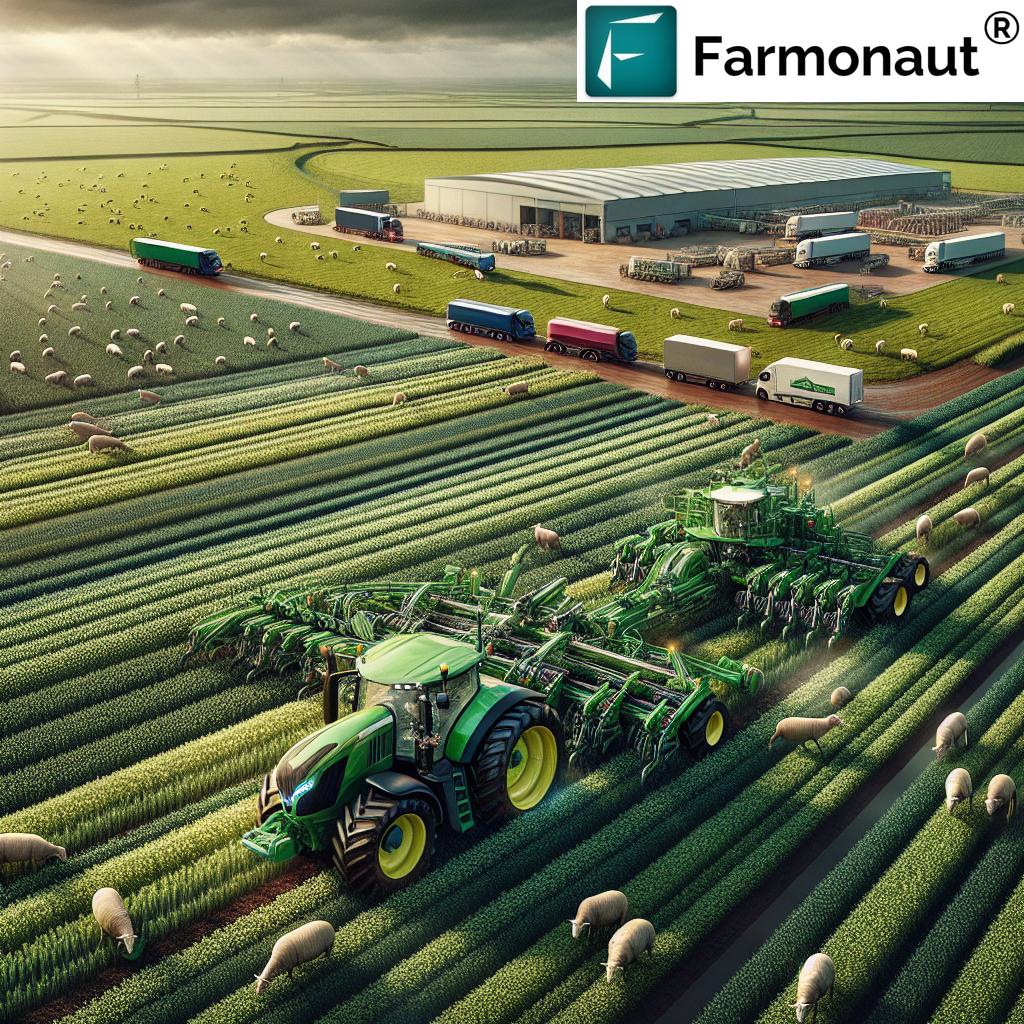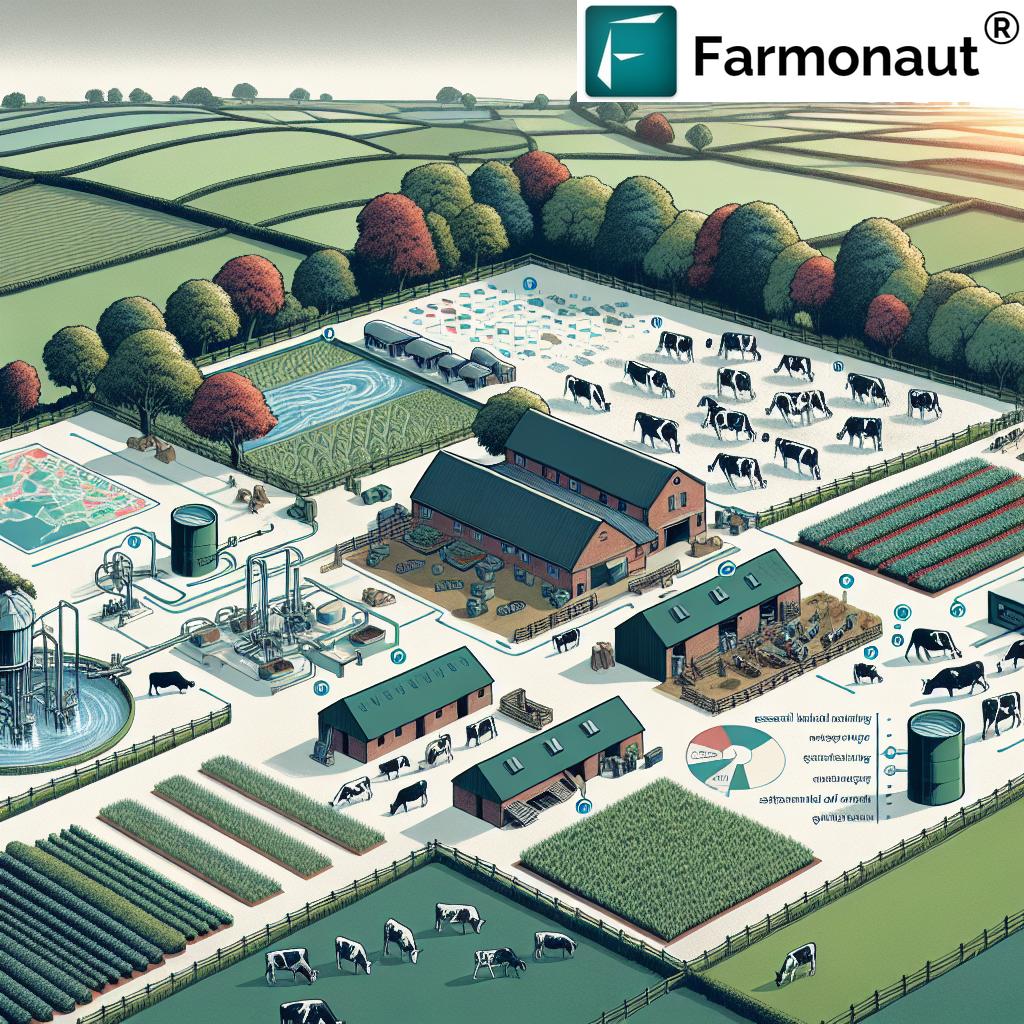UK Food Supply Chains at Breaking Point: Urgent Measures Needed for Agricultural Sustainability
“UK farmers face a double challenge: 70% of farm equipment is imported, while 60% of food consumed is produced domestically.”
In recent years, we’ve witnessed unprecedented challenges facing the UK’s agricultural sector and food supply chains. As industry experts and representatives of Farmonaut, we’re deeply concerned about the current state of affairs and the urgent need for sustainable solutions. Today, we’ll delve into the complexities of UK food supply chains, exploring the pressing issues affecting farms, crops, and livestock across England, Scotland, and Wales.

The Current State of UK Agriculture
The UK agricultural sector is facing a perfect storm of challenges. Brexit, the ongoing global pandemic, and climate change have all contributed to creating a volatile environment for farmers and food producers. Let’s break down some of the key issues:
- Supply Chain Disruptions: Post-Brexit trade agreements have led to significant delays and increased costs for importing essential farm equipment and supplies.
- Labour Shortages: The agricultural industry heavily relies on seasonal workers, many of whom came from EU countries. New immigration policies have resulted in a severe shortage of labour.
- Rising Production Costs: Energy prices, fertilizer costs, and other inputs have skyrocketed, putting immense pressure on farmers’ profit margins.
- Climate Variability: Extreme weather events, such as floods and droughts, are becoming more frequent, impacting crop yields and livestock health.
These factors combined have put UK food supply chains at a breaking point, necessitating urgent measures to ensure agricultural sustainability and food security.
The Impact on Different Agricultural Sectors
Let’s examine how these challenges are affecting various sectors of UK agriculture:
Arable Farming
Crop farmers are struggling with multiple issues:
- Difficulties in importing specialized machinery like combines, drills, and cultivators
- Increased costs of pesticides and fertilizers
- Unpredictable weather patterns affecting planting and harvesting schedules
These factors have led to reduced crop yields and quality, impacting the supply of essential grains and vegetables to the UK market.
Livestock and Dairy
The livestock sector, including dairy, beef, and sheep farming, faces its own set of challenges:
- Rising costs of animal feed and veterinary supplies
- Labour shortages affecting milking operations and animal care
- Difficulties in exporting live animals and animal products due to new regulations
These issues have led to increased stress on farmers and, in some cases, a reduction in herd sizes.
Horticulture
The fruit and vegetable sector, crucial for local food production, is grappling with:
- Severe labour shortages for harvesting
- Increased costs of greenhouses and irrigation systems
- Challenges in meeting supermarket demand due to reduced yields
This has resulted in some crops being left unharvested and a greater reliance on imports to meet consumer demand.
The Urgency of Agricultural Sustainability
Given these challenges, it’s clear that urgent measures are needed to ensure the sustainability of UK agriculture. Sustainable farming practices are not just environmentally friendly; they’re essential for the long-term viability of the sector and the country’s food security.
Key areas that need addressing include:
- Resource Management: Implementing efficient water use and soil conservation techniques
- Renewable Energy: Encouraging the adoption of solar, wind, and biomass energy on farms
- Precision Agriculture: Utilizing technology to optimize crop yields and reduce resource waste
- Biodiversity: Promoting practices that support wildlife and maintain ecosystem balance
At Farmonaut, we’re committed to supporting farmers in their journey towards sustainability. Our satellite-based crop health monitoring and AI-driven advisory systems help farmers make informed decisions about resource use, potentially reducing waste and improving yields.
The Role of Technology in Agricultural Resilience
In these challenging times, UK farming technology is playing a crucial role in building agricultural supply chain resilience. Advanced technologies are helping farmers adapt to changing conditions and optimize their operations:
- Satellite Imagery: Provides real-time data on crop health and soil conditions
- IoT Sensors: Monitor livestock health and environmental conditions in real-time
- AI and Machine Learning: Offer predictive insights for better decision-making
- Blockchain: Enhances traceability in the food supply chain
Farmonaut’s platform integrates many of these technologies, offering farmers a comprehensive solution for managing their operations more efficiently. Our API also allows for seamless integration with other farm management systems.
Government Support and Policy Measures
To address the current crisis, agricultural policy support from the UK government is crucial. Some key areas where government intervention could make a significant difference include:
- Financial Support: Providing grants and subsidies for sustainable farming practices
- Trade Agreements: Negotiating favorable terms for agricultural imports and exports
- Labour Policies: Implementing schemes to address the shortage of agricultural workers
- Research and Development: Investing in agricultural innovation and technology
These measures could help alleviate some of the immediate pressures on farmers and pave the way for a more resilient agricultural sector.
“Post-Brexit, UK agriculture grapples with a 25% decrease in seasonal workers, impacting harvest efficiency and food production.”
Diversification: A Strategy for Resilience
In the face of these challenges, many UK farmers are turning to diversification as a strategy to increase resilience and profitability. Some popular diversification strategies include:
- Agritourism: Opening farms for visitors, offering accommodation or experiences
- Value-Added Products: Processing raw farm products into higher-value goods
- Renewable Energy: Installing solar panels or wind turbines on farmland
- Alternative Crops: Experimenting with new, climate-resilient crop varieties
Diversification not only provides additional income streams but also helps spread risk, making farms more resilient to market fluctuations and environmental challenges.

The Future of UK Farming: Trends and Predictions
As we look to the future of UK farming, several trends are emerging that could shape the industry:
- Vertical Farming: Urban agriculture solutions to supplement traditional farming
- Regenerative Agriculture: Practices focused on soil health and carbon sequestration
- Plant-Based Proteins: Increased production of alternative protein sources
- Smart Farming: Greater adoption of AI, IoT, and robotics in farm operations
At Farmonaut, we’re continuously evolving our technology to meet these emerging trends. Our API Developer Docs provide insights into how our technology can be integrated into various smart farming solutions.
Consumer Awareness and Local Food Movement
An important factor in addressing UK food supply chain issues is increasing consumer awareness about the importance of supporting local agriculture. The local food movement has gained significant traction in recent years, with benefits including:
- Reduced food miles and carbon footprint
- Support for local economies and rural communities
- Increased food security and resilience
- Better traceability and food quality
Encouraging consumers to choose locally produced food can help strengthen UK agriculture and reduce dependence on imports.
The Role of Farmonaut in Supporting UK Agriculture
At Farmonaut, we’re committed to supporting UK farmers through these challenging times. Our platform offers several key benefits:
- Real-time Crop Monitoring: Our satellite-based technology allows farmers to track crop health and spot issues early
- Resource Optimization: AI-driven insights help farmers make efficient use of water, fertilizers, and other inputs
- Weather Forecasting: Accurate, localized weather predictions aid in planning farm operations
- Supply Chain Transparency: Our blockchain solution enhances traceability from farm to fork
By leveraging these technologies, UK farmers can improve their resilience, productivity, and sustainability.
UK Agricultural Supply Chain Disruptions and Solutions
| Sector | Current Challenges | Impact on Food Security | Proposed Solutions |
|---|---|---|---|
| Crop Farming | Import difficulties for equipment, labour shortages | High (30% reduction in yields) | Government support for equipment leasing, technology adoption |
| Livestock | Rising feed costs, export restrictions | Medium (15% decrease in production) | Local feed production incentives, new trade agreements |
| Dairy | Labour shortages, increased operational costs | High (25% reduction in output) | Automation technology, price support mechanisms |
| Horticulture | Seasonal worker shortages, climate variability | High (40% of crops at risk) | Robotic harvesting, protected cultivation techniques |
| Farm Equipment | Import delays, increased costs | Medium (20% shortage in machinery) | Domestic manufacturing incentives, equipment sharing schemes |
Conclusion: A Call for Collective Action
The challenges facing UK food supply chains and agricultural sustainability are complex and multifaceted. Addressing these issues requires a coordinated effort from farmers, policymakers, technology providers, and consumers. By embracing sustainable practices, leveraging innovative technologies, and supporting local agriculture, we can work towards a more resilient and secure food system for the UK.
At Farmonaut, we remain committed to playing our part in this crucial transition. By providing farmers with cutting-edge tools and insights, we aim to contribute to a more sustainable and productive agricultural sector in the UK and beyond.
FAQ Section
Q: How is Brexit affecting UK agriculture?
A: Brexit has led to challenges in importing farm equipment, labour shortages due to restrictions on EU workers, and complications in exporting agricultural products to the EU.
Q: What role does technology play in addressing agricultural challenges?
A: Technology like satellite imagery, AI, and IoT sensors helps farmers optimize resource use, monitor crop health, and make data-driven decisions, improving overall efficiency and sustainability.
Q: How can consumers support UK agriculture?
A: Consumers can support UK agriculture by choosing locally produced food, participating in farm-to-table initiatives, and being willing to pay fair prices for high-quality, sustainably produced food.
Q: What government measures could help UK farmers?
A: Key government measures include financial support for sustainable practices, favorable trade agreements, policies to address labour shortages, and investment in agricultural research and development.
Q: How is climate change impacting UK farming?
A: Climate change is causing more frequent extreme weather events, altering growing seasons, and introducing new pests and diseases, all of which affect crop yields and livestock health.






